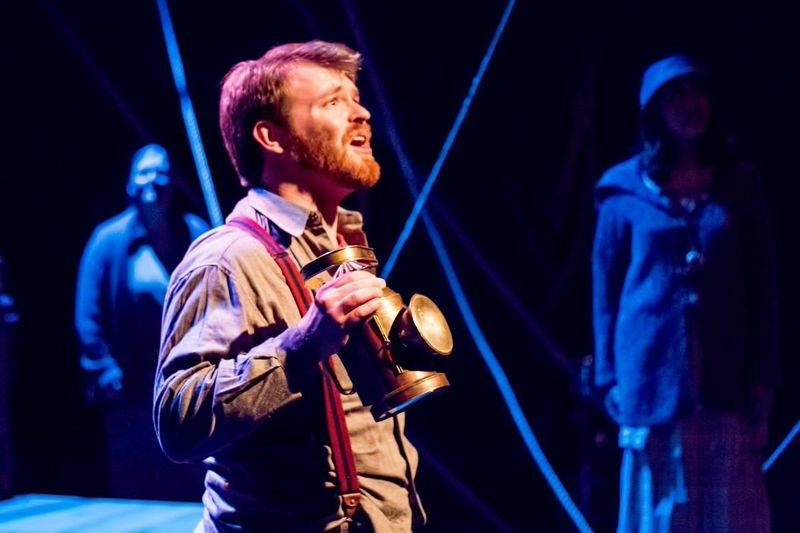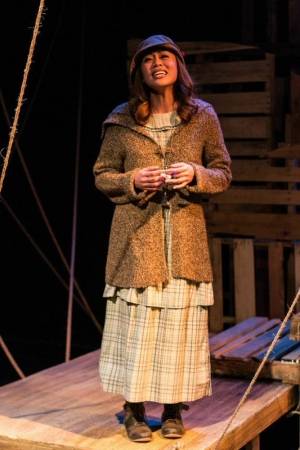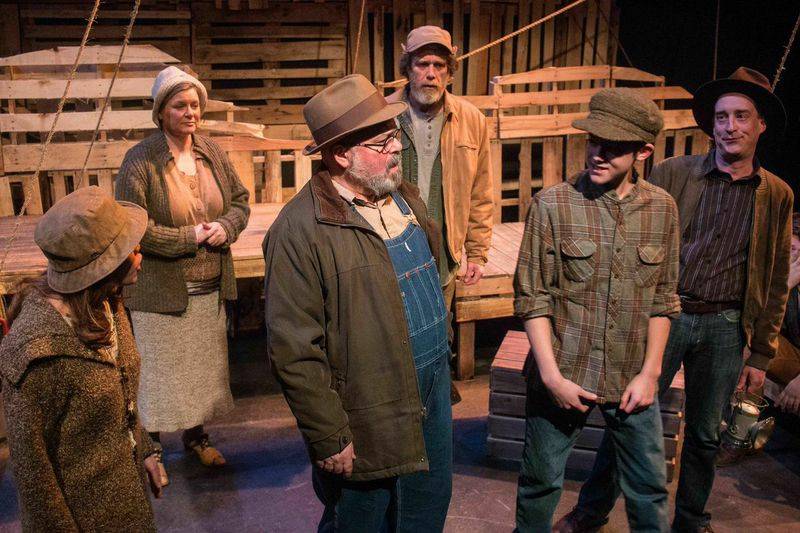As one enters the world of Floyd Collins, one is introduced to a family that, since the death of its matriarch, has attempted to stitch itself back together, through remarriage and the pursuit of dreams. With the distant death still looming large, creating tension and uncertainty within the family, there remains a willingness among the survivors to stick together.
The titular Floyd Collins, played by the charming and energized Andy Hudson, is an avid explorer who dreams of earning himself and his family glory in an unusual and dangerous way: cave digging. In his ultimate fantasy, Floyd would discover “fortune underground” and open sand cave exhibits where customers purchase tickets to view the natural phenomena. In his quest for this dream, however, Floyd gets his foot stuck and is unable to crawl out of the small hole he has squeezed through. His family must recruit the assistance of other community members once their initial rescue attempts fail. Floyd, himself, isn’t worried about being stuck in the cave, as this isn’t his first time; throughout the ordeal he remains certain that his “luck” will get him out. This “luck,” which seems to be a combination of faith in God, love for nature, and trust in his family, ultimately proves insufficient.

As Floyd Collins’s story gains more press, Floyd’s family members see their lives made into public spectacle. Nellie Floyd, played by the vocally stunning Marah Sotelo, must endure the rehashing of her time spent in a mental institution rehashed; and Homer Floyd, executed passionately by Director Kyle A. Thomas, has his dream of celebrity dangled in front of his eyes, distracting him from saving his brother’s life. As the sensationalized account of Floyd’s misfortune continues, even the community and the Collins clan fall into self-serving patterns. Everyone seems to be making — or trying to make — money off of Floyd, with the exception of the Collins family, who are seen collecting bottles for a dime after having to spend their savings on planned excavations to save Floyd’s life.
One might wonder at this juncture: How can a man getting trapped in a cave be depicted onstage? Director Kyle A. Thomas has effortlessly created specific action out of the imaginary space. Thomas’s impressive use of the stage is well supported by his clear understanding of how the dramatic structure of the piece works and how to strategically direct our attention in a play where the titular character spends most of his time underground. Whether the actors are leaning over a crate to speak into an imaginary hole or attaching a harness and pulling Floyd out of the cave, one is never confused about the actions being executed. Through sophisticated and engaging storytelling, Thomas is able to offer the audience his own take on the show, while still allowing them to attribute their own imagination to the piece.
 At no point did I question the characters onstage. The family dynamic presented is specific, realistic, and easily identifiable. We are seeing characters who know who they are and don’t apologize for it. We see regular, grounded people who are a part of a simple Kentucky community. Homer and Floyd’s relationship is relatable and we trust that there is a history between these two brothers that makes their parting especially difficult. Their duet that closes Act One is playful, hilarious, and aurally pleasing. And as Nellie, Marah Sotelo’s beautiful voice creates cave echoes and dreamy melodies sung with strong intentions and powerful results.
At no point did I question the characters onstage. The family dynamic presented is specific, realistic, and easily identifiable. We are seeing characters who know who they are and don’t apologize for it. We see regular, grounded people who are a part of a simple Kentucky community. Homer and Floyd’s relationship is relatable and we trust that there is a history between these two brothers that makes their parting especially difficult. Their duet that closes Act One is playful, hilarious, and aurally pleasing. And as Nellie, Marah Sotelo’s beautiful voice creates cave echoes and dreamy melodies sung with strong intentions and powerful results.
Sure there were times when small mistakes were made, but, as an audience member, I didn’t dwell on them. There were too many visually and aurally stimulating things holding my attention. Of those elements, the production’s technical aspects stand out, as they clarify what is happening and direct the eye appropriately. While the set creates an abstract playing space with wood and ropes, we didn’t worry for its durability as actors climb, jump, and crawl through it. At a glance, the set also defines the caliber of theatre the audience is going to see. The lighting does a great job of allowing the eye to adjust, while slowly taking it to the important action onstage, and the costume design indicates the characters’ given circumstances and allows us to better distinguish Floyd’s dreams from reality in a stunning final stage picture.
We are, to some extent, left thinking what Floyd, a simple and likable man, has done to deserve to die underground. Though the musical is grounded in real life events, its presentation onstage leaves a lesson to be interpreted. To some, the relationship that will define the piece will be that of nature and man. Does Floyd die because of karmic retribution? Does his exploitation of nature prompt society’s exploitation of his death? Or do Floyd’s dreams of a heaven with “trees” and “light” and his communication with crickets suggest his pure intentions for the caves in a society built on consumerism? Ultimately the show presents us with the idea that the life of one man can matter, even as an enterprise. We are encouraged, by this exquisite piece of storytelling, to follow our own dreams and to discover what our contribution to the world, however bizarre, will be.
Catch the Station Theatre’s production of Floyd Collins February 25th through March 7th at 8 p.m. Tickets are $10 on Wednesdays, Thursdays, and Sundays, and $15 on Fridays and Saturdays.
Photos by Sam Logan.








